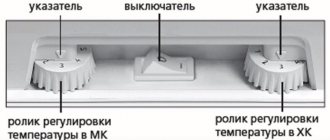Why are food products kept in refrigerated cabinets?
Modern devices allow you to preserve the freshness of food for a very long time. An even longer period of maintaining the normal state of food is when the food is not only correctly placed in the refrigerator, but also the food proximity is observed and packaged in specialized sealed containers and vacuum packaging.
In addition, the reason for storing food in the refrigerator is the fact that certain conditions have been created in the unit that prevent the development and reproduction of pathogenic microflora - bacteria, which are the main cause of spoilage. Although food gradually loses its original properties even in a refrigerator, it does so much more slowly, since those bacteria that can survive in the cold develop less actively.
Considering the conditions that are created in the freezer compartment of the refrigerator, they are such that it is even more difficult for pathogens to survive and function normally in them. Due to such circumstances, bacteria need a period of more than one year to reach a critical amount and provoke, for example, in meat, irreversible decay processes that make the product unfit for consumption.
Attention! A refrigerator is an equipment or tool that allows you to delay food spoilage for several days, weeks, and in the case of a freezer, months or even one to two years (the period varies depending on the specific product).
Why should meat be kept in a closed container in the refrigerator?
The best option is to use fresh meat for culinary purposes; according to the standards, restaurants and other catering establishments are required to prepare the dishes they serve from the chilled product. This is possible due to the fact that establishments make daily purchases of meat products, which are kept in the refrigerator compartment in tightly sealed containers throughout the day. Also, sometimes meat products are tightly wrapped in cling film. In catering establishments there is a separate refrigerator for meat, since according to the rules of food neighborhood, it cannot be stored next to the following items:
- dairy products;
- fermented milk products;
- fish and seafood;
- confectionery products;
- vegetables and fruits.
SanPiN 2.3.2.1324-03:
3.3.4. It is not allowed to store raw and semi-finished products together with ready-to-eat food products.
At home, it is quite difficult to purchase meat products every day, and storing them in a separate refrigerator is often not possible at all. Therefore, if you plan to purchase immediately for a long period, keep the meat in the freezer, observing the following rules:
- It is permissible to send the product to the freezer only in a tightly tied plastic bag or food box with a lid.
- Meat in the freezer should be packaged in small portions - one at a time, so as not to defrost a large piece at once, since repeated freezing has a bad effect on the quality of the product. This is due to the fact that, according to SanPiN, re-freezing meat is prohibited.
- Each container must be marked with the date of freezing, time and name of the product sent to the freezer.
With this storage method, the shelf life of fresh meat products is from three months, depending on the temperature maintained in the freezer.
Why you need to store fish and seafood in the refrigerator
Fish and other seafood have a characteristic odor that easily transfers to other types of food stored in the refrigerator. For this reason, it is not practical to keep fish products open and in a common compartment. Such food must be packaged hermetically in tightly closed food boxes. It is required to freeze fish products in small volumes (at a time) and label them indicating what kind of product it is when it is frozen.
Reference! In catering establishments, according to the norms and rules of the food neighborhood, seafood is also required to be purchased daily, stored refrigerated and in a separate refrigerator.
Why you should keep perishable foods in the refrigerator
A household refrigerator is a place that meets the following criteria:
- strictly defined humidity indicators;
- inaccessibility to direct sunlight;
- temperature at 0...+8 ̊С.
These parameters allow you to extend the shelf life of perishable foods and ensure that they remain fresh for the period specified by the manufacturer. This is due to the fact that at low temperatures, the processes of decomposition and oxidation slow down significantly, and as a result, products begin to deteriorate more slowly.
For example, salmonella and E. coli do not reproduce at temperatures below +5 ̊C, and listeria becomes inactive at +4 ̊C or less. But, food still cannot be stored in the refrigerator compartment for weeks, since the development and reproduction of bacteria does not stop completely, but only slows down, that is, the same soup will not last longer than one week. However, in the refrigerator the former can last for 3-7 days without spoiling, and at room temperature the soup will turn sour within a few hours after preparation.
Attention! Some mucus-forming pathogens can develop on the surface of meat even at a temperature of 0 C, and fungi can progress at subzero temperatures, appearing on meat products during prolonged storage in the freezer.
We hope for the cold
Photo: depositphotos/serezniy
The expert drew attention to the fact that leftover prepared food, as well as thermally processed foods, should be put into the refrigerator or frozen no later than two hours after preparation.
“Dishes that have been out of refrigeration for more than two hours at room temperature or an hour at air temperatures above 35 degrees should be thrown away,” warned Olga Lushnikova.
The specialist also advised storing cooked food in airtight containers. Or the products can be carefully packaged in cling film or parchment paper. It is advisable to sign packages or containers in the refrigerator, and food that has stayed longer than four days should be mercilessly thrown away, the Moscow 24 interlocutor added.
If you understand that you will not be able to eat a dish in the near future, then it is better to freeze it immediately, since the shelf life in the freezer increases significantly. Do not leave cutlery in containers where prepared food is stored, for example, a ladle in a pot of soup. Olga Lushnikova
general practitioner and nutritionist
The temperature in the refrigerator, according to the nutritionist, should be no higher than four degrees. Moreover, at the back wall the degree is slightly lower than near the door.
According to the expert, it is better not to place ready-made dishes next to raw foods. In addition, there should be no spoiled food or unpleasant odor in the refrigerator. Therefore, it is necessary to monitor its cleanliness, Lushnikova emphasized.
The need for a refrigerator - a chemical point of view
In accordance with Van't Hoff's rule, the rate of the reaction increases by 2-4 times with an increase in temperature for every 10 °C. That is, in warmth, chemical reactions occur much faster than at low temperatures. This can be considered using the example of enzymatic reactions involving enzymes that are produced by microorganisms and act as catalysts (provocateurs). Thus, the souring of dairy products, also known as lactic acid fermentation, is one of the clear examples of such an enzymatic reaction.
Some of the food enzymes and microorganisms present in foods continue their activity even at low temperatures, since their activity is based not only on the thermometer readings, but also on the level of humidity. The more moisture is present in a food product, the more rapidly internal processes occur and the shorter the shelf life of this food. Freezing, which transforms water into a solid state of aggregation, significantly reduces the rate of fermentation reactions and other processes that occur in the product, but does not stop them completely.
Storage conditions
Reproduction of most bacteria is possible in the temperature range +10...+55C. Therefore, the optimal temperature in the refrigerator compartment is considered to be +5…+8C. Under such conditions, E. coli, salmonella and some types of fungi practically stop reproducing. However, to stop listeria activity, the temperature must be lowered below +4C.
At standard temperatures in the refrigerator compartment, microorganisms that create mucus on meat continue to function, although with less activity. Mold fungus, despite the sub-zero temperature in the freezer, forms colonies on meat during long-term storage. The activity of food enzymes and microorganisms depends not only on temperature, but also on humidity.
The more moisture in a product, the faster it deteriorates. Freezing reduces activity, but does not stop it. Therefore, products should be stored in the refrigerator no longer than the expiration date indicated on them. Perishable foods should always be stored in the refrigerator.
The most attractive environment for microorganisms is meat and dairy products. Raw meat can be stored in the refrigerator for no more than a day, and minced meat for only 12 hours. This can be explained by the fact that its surface area is 10 times greater than that of a whole piece. Accordingly, the number of microorganisms is the same number of times greater, so they will quickly render the minced meat unusable.
Enzymes, biologically active substances contained in products, trigger biochemical processes that change taste and color. Maximum enzyme activity occurs in the range of +30…+60C. At temperatures below +8C, activity drops to almost zero. If the air humidity is less than 100%, the food on top will dry out.
Since the amount of humidity depends on temperature, it is necessary to maintain it at a constant level not only in the refrigerator, but also in the freezer. And here I remember chemistry at school - it becomes clear why foods become rancid during storage and lose vitamins. They simply oxidized when interacting with oxygen in the air.
Only products in vacuum packaging do not oxidize. Storing food in hermetically sealed containers slows down this process and helps retain moisture.
Biological justification for the need for a refrigerator
From a biological point of view, products must be kept in the refrigerator to prevent the proliferation of pathogenic microorganisms - fungi and bacteria. They can develop and reproduce only in conditions of fairly high temperatures, and the conditions maintained in a refrigerator are not favorable for them.
Also, it is necessary to take into account that various food products - fermented milk, meat, fruits and vegetables - contain microorganisms, the rate of development of which differs depending on favorable conditions. On this basis, food neighborhood rules were developed that regulate how, what and where to store. In addition to the above, the expiration dates for such products are also different due to the fact that the microflora in different types of products develops only under certain conditions and for a certain time. When a product is expired, it cannot be eaten, as it already poses a health threat and can lead to serious digestive problems.
Foods that should not be kept in the refrigerator
People often try to store everything in a refrigerator, but it is not recommended to keep some types of products at low temperatures. These types include the following:
- Spices and seasonings – the taste characteristics and aroma of seasonings deteriorate.
- Watermelon - put into the refrigerator only after opening, and until the integrity of the peel is damaged, it is better to keep it at room temperature in a dark place.
- Honey - in the refrigerator it rapidly crystallizes and loses its original appearance, but at room temperature this product can last for years.
- Bananas - at low temperatures the skin quickly darkens, but even at room temperature they do not last long, the best option is to eat them on the first day after purchase.
- Garlic - long-term storage requires ventilation, dryness and average temperatures, so in the refrigerator this product rapidly loses its original properties, beginning to sprout prematurely.
- Onions and potatoes retain their original qualities at room temperature, but the ideal temperature for storing them is +10...+15 ̊C, which is slightly higher than the temperature in the refrigerator.
Any dish that is removed from the refrigerator before being served must be inspected for damage. If there are at least some signs - a change in smell, color, consistency - you cannot eat such food, since it has already disappeared and you just need to throw it away.
Results
Storing food in the refrigerator is a necessity, but each item must be sent to the correct compartment (refrigerator or freezer), packaged well and kept in accordance with the rules of the grocery neighborhood. You should not thoughtlessly send all the products in a row to the refrigerator, as some of them do not fit well in low temperatures and only spoil faster.
Video: How to properly store food in the refrigerator
How to properly store food in the refrigerator
Watch this video on YouTube
Video: How to CORRECTLY STORE FOOD IN THE REFRIGERATOR! What's in MY Fridge?
How to CORRECTLY STORE FOOD IN THE REFRIGERATOR! What's in MY Fridge?
Watch this video on YouTube
Do you want to understand better than others?
- How meat and perishable foods were stored when there were no refrigerators - How difficult it is for modern people to understand their ancestors, who did without technological creations. And how did they manage to keep food fresh when there were no refrigerators......
- How to properly store food in the refrigerator and maintain order - Probably, this has happened to everyone: you open the refrigerator in search of something tasty, but, having glanced at the shelves, you close the door without profiting from anything....
- Here's how much and how you really need to store caviar in the refrigerator - Black and red varieties of caviar are valuable products, the composition of which contains a lot of microelements necessary for the body. With the help of caviar you can refine a wide…
- Is it possible to store bananas in the refrigerator - The article describes how to store bananas: when they need room temperature, in which case storage in the refrigerator is acceptable, options for freezing fruit. Storage temperature...
- Why you can’t store melon in the refrigerator - In the refrigerator, melon will quickly lose its juiciness, become tasteless and acquire a bitter taste. Another reason why melons cannot be kept at low temperatures is high...











